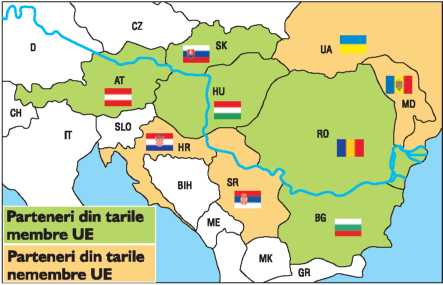 OBJECTIVES
OBJECTIVES
 Inland navigation is a promising, environmental-friendly transport mode. Since transports mostly are carried out beyond national borders, existing international conventions ensure smooth operation of vessels along the rivers and unify national laws. Besides fairway related issues, technical requirements for vessels and guidelines for the transport of dangerous goods, also the management of the ship wastes shall follow harmonised and state-of-the-art procedures. Yet, an International Danube Ship Waste Convention along the Danube is missing. Inland navigation is a promising, environmental-friendly transport mode. Since transports mostly are carried out beyond national borders, existing international conventions ensure smooth operation of vessels along the rivers and unify national laws. Besides fairway related issues, technical requirements for vessels and guidelines for the transport of dangerous goods, also the management of the ship wastes shall follow harmonised and state-of-the-art procedures. Yet, an International Danube Ship Waste Convention along the Danube is missing.
Based on the findings of the foregoing WANDA project (www.wandaproject.eu), the main focus of CO-WANDA is to start initiative work for a binding treaty, which shall provide clear guidelines for ship waste management. The support of national and international authorities, stakeholders and opinion leaders is a driving force for the successful implementation of the international cooperation activities. In fact, the harmonisation and adaptation of currently running ship waste management systems will decrease the risk of illegal discharges of ship wastes and thereby support the protection of valuable river ecosystems and the means of livelihoods for future generations in the Danube region.
 ACTIVITIES
ACTIVITIES
 All measures aim at the development of an International Danube Ship Waste Convention (IDSWC), which harmonises ship waste management along the Danube. All measures aim at the development of an International Danube Ship Waste Convention (IDSWC), which harmonises ship waste management along the Danube.
1. Advancement of running ship waste management systems
Common strategies for waste prevention (1), cargo related wastes (2) and wastes from passenger vessels (3) which will be developed in cooperation with inland waterway companies, help to save resources, raise the awareness of the vessels´ crew and reduce waste amounts. A comprehensive, user-friendly state - of - the art ship waste reception facilities network (4) protects the river from illegal waste dumping. Unified procedures for payment of ship waste disposal and usage of River Information Services for communication between vessels, service providers and controlling authorities are part of the conceptual approach to the IDSW (5).
2. Implementation of practical tests and pilot activities
Practical tests and pilot actions verify developed technical concepts and allow gathering of data. Hence, they shall be developed along the whole Danube Stretch, covering the Upper, Middle and Lower Danube region. Activities comprise testing of the financing model for oily and greasy ship waste elaborated in WANDA (1), tests of waste cards for vessels and integration of River Information Services into waste disposal services (2). Data gathered and findings made will build the empiric basis for preparation of the IDSWC.
3. Development of an International Ship Waste Convention on the Danube
A binding international ship waste convention harmonises and coordinates the development of ship waste management systems along the Danube. The initiation and implementation of pre-paratory activities will be developed in strong cooperation with experts from the field of inland navigation, national administration and public international law. Existing initiatives, like the Danube Commission's recommendations for ship waste management, serve as starting points. An "International Implementation Board", formed by experts during the project's lifetime, will press ahead the implementation of the International Danube Ship Waste Convention.
 BUDGET
BUDGET
Bugetul total al proiectului (exclusiv TVA) |
1.719.870,18 € |
Bugetul CN APDM SA Galati (exclusiv TVA) |
298.926,00 € |
Fonduri UE-FEDR (85%): |
254.087,10 € |
Co finantare nationala MDRT (13%): |
38.860,38 € |
Co finantare nationala Surse proprii (2%): |
5.978,52 € |
 RESULTS
RESULTS
Network and awareness raising: Project Partners of EU member States and non-EU member states will continue their well-proven partnership, which shall be amended with new partners. International observer organisations from the fields of inland navigation, environmental protection as well as stakeholders, interest groups, administrations and research institutes are ready to support the development of a common agreement on the handling of ship waste.
Usability and long term orientation: The solutions elaborated are focused on the provision of clear guidelines for ship waste management. A vivid exchange of information with experts, inland waterway transport companies and authorities as well as findings made in WANDA provide the basis for sound, user-friendly solutions with an emphasis on practical applicability for collection of ship waste. Adaptation of waste disposal services, the implementation of the polluter-pays-principle and establishment of controlling mechanisms are processes, which will be implemented stepwise in the participating countries. Indeed, the full implementation of these activities reaches beyond the projects lifetime.
Governance: The need for environmental-friendly transport modes will increase in the future. This development calls for the establishment of ship waste management systems along inland waterways. Once started, the activities improve the environmental performance of inland waterway transports, enhance fleet modernisation and are a driving force for the establishment of international partner-ships. Finally, international cooperation activities promote sustainable solutions in environmental protection and economic prosperity.
 DURATION, GEOGRAPHICAL COVERAGE AND CONSORTIUM
DURATION, GEOGRAPHICAL COVERAGE AND CONSORTIUM
 CO-WANDA project started in October 2012 and is scheduled to end in September 2014 (24 months).
CO-WANDA project started in October 2012 and is scheduled to end in September 2014 (24 months).
12 Project partners out of 9 countries (AT, SK, HU, HR, RS, RO, BG, UA, MD)
The observer organisations:
 Danube Commission Danube Commission
 Central Commission for the Navigation of the Rhine Central Commission for the Navigation of the Rhine
 Sava Commission Sava Commission
 International Commission for the Protection of the Danube River International Commission for the Protection of the Danube River
 Austrian Federal Ministry of Transport, Innovation and Technology Austrian Federal Ministry of Transport, Innovation and Technology
 Bilgenentwässerungsverband Bilgenentwässerungsverband
 COHERENCE WITH INTERNATIONAL POLICIES AND STRATEGIES
COHERENCE WITH INTERNATIONAL POLICIES AND STRATEGIES
Sustainability is one of the priorities of EU 2020, the European Union's growth strategy for the current decade. CO-WANDA contributes to sustainable growth by pressing ahead environmental protection, reduction of emissions and cooperation with inland waterway companies and ports. Through the advancement of the sector's environmental performance, CO-WANDA enhances the competitive position of inland waterway transport in the Danube Region.
Waste prevention and management are one of the four top priorities of EU´s Sixth Environment Action Programme (2002 - 2012). The preventive approach to waste management is detailed in the Thematic Strategy on Waste Prevention and Recycling and the Waste Framework Directive (2008) where it has highest priority in the waste hierarchy. Also, member states are required to develop waste prevention programs not later than December, 12th 2013. CO-WANDA has a clear focus on waste prevention on vessels and will support national waste prevention plans by its findings.
The European Action Programme for Inland Waterway Transport (NAIADES) aims at promoting inland waterway transport. CO-WANDA contributes to three out of five defined strategic areas, namely fleet, infrastructure and market.
Danube Region Strategy supports creation of synergies between existing policies and initiatives in the Danube Region. WANDA is explicitly mentioned as a contribution to the "Improvement of Mobility and Multimodality"; moreover it clearly supports other identified priorities, such as environmental protection or strengthening the region by fostering trans-national cooperation.
|